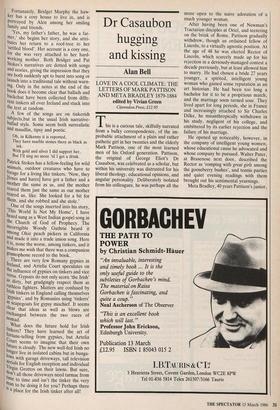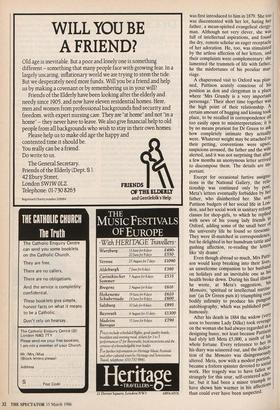Dr Casaubon hugging and kissing
Alan Bell
LOVE IN A COOL CLIMATE: THE LETTERS OF MARK PATTISON AND META BRADLEY 1879-1884 edited by Vivian Green
Clarendon Press, £12.95
This is a curious tale, skilfully narrated from a bulky correspondence, of the im- probable attachment of a plain and rather pathetic girl in her twenties and the elderly Mark Pattison, one of the most learned men of his Oxford generation. Pattison, the original of George Eliot's Dr Casaubon, was celebrated as a scholar, but within his university was distrusted for his liberal theology, educational opinions, and angular personality. Deliberately isolated from his colleagues, he was perhaps all the more open to the naive adoration of a much younger woman.
After having been one of Newman's Tractarian disciples at Oriel, and teetering on the brink of Rome, Pattison gradually withdrew, though an ordained fellow of Lincoln, to a virtually agnostic position. At the age of 48 he was elected Rector of Lincoln, which scarcely made up for his rejection in a deviously-managed contest a decade previously, but at least allowed him to marry. He had chosen a bride 27 years younger, a spirited, intelligent young woman who gained some reputation as an art historian. He had been too long a bachelor for it to be a propitious match, and the marriage soon turned sour. They lived apart for long periods, she in France and increasingly attached to Sir Charles Dilke, he misanthropically withdrawn in his study, negligent of his college, and embittered by its earlier rejection and the failure of his marriage.
He opened up noticeably, however, in the company of intelligent young women, whose educational cause he advocated and whose company he pursued. Walter Pater, at Brasenose next door, described the Rector as 'romping with great girls among the gooseberry bushes', and tennis parties and quiet evening readings with them brought out his sentimental yearnings.
Meta Bradley, 40 years Pattison's junior, was first introduced to him in 1879. She too was discontented with her lot, hating her father, a mean-spirited evangelical clergy- man. Although not very clever, she was full of intellectual aspirations, and found the dry, remote scholar an eager receptacle of her adoration. He, too, was stimulated by the artless affection of her letters, and their complaints were complementary: she lamented the trammels of life with father, he the misfortunes of his peculiar mar- riage.
A chaperoned visit to Oxford was plan- ned, Pattison acutely conscious of his position as don and clergyman in a place where 'Mrs Grundy is a very important personage.' Their short time together was the high point of their relationship. A certain amount of hugging and kissing took place, to be recalled in correspondence all too easily open to misinterpretation; it Is by no means prurient for Dr Green to ask how completely intimate they actuallY were. Whatever weight may be attached to their petting, conventions were upset, suspicions aroused, the father and the wife alerted, and it was not surprising that after a few months an anonymous letter arrived to discompose them. The details are nil- portant.
Except for occasional furtive assigna- tions in the National Gallery, the rela- tionship was continued only by post, Meta's letters eventually forbidden by her father, who disinherited her. She sent Pattison budgets of her social life in Lon- don, and her social work in sanitary reforin classes for shop-girls, to which he replie.d with news of his young lady friends In Oxford, adding some of the small beer et' the university life he found so tiresome. They were ill-matched in correspondence, but he delighted in her humdrum tattle and gushing affection, re-reading the letters like 'sly drams'. Even though abroad so much, Mrs Patti" son would keep breaking into their lives: an unwelcome companion to her husbann on holidays and an inevitable one as his health broke down. During his final illnes.s he wrote, at Meta's suggestion, .his Memoirs, 'spiritual or intellectual narciss- ism' (as Dr Green puts it) triumphing over. bodily infirmity to produce his pungen` autobiography, which was published post- humously. After his death in 1884 the widow (verY soon to become Lady Dilke) took revenge on the woman she had always regarded.as 3 designing hussy, not least because Pattison had slyly left Meta £5,000, a ninth of his whole fortune. Every reference to he in his diary was scissored out, and the dedica tion of the Memoirs was disingenuou. altered. Meta, now with a modest portion; became a forlorn spinster devoted to soci o work. Her tragedy was to have fallen s strangely for this sour, self-centered sch% lar, but it had been a minor triumph. I , have shown him warmer in his affections than could ever have been suspected.



















































 Previous page
Previous page